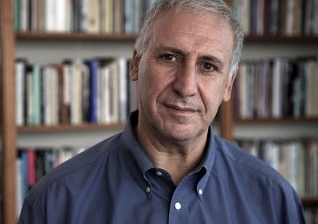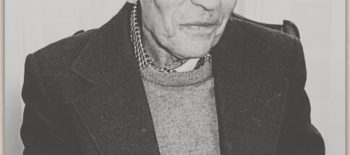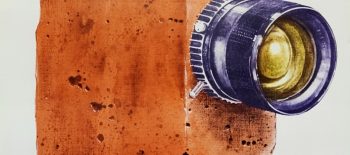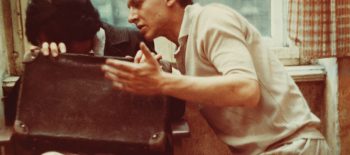Polish Poetry Unites is a video series for anyone interested in literature, history and reading. In each episode Edward Hirsch, a distinguished American poet, and the president of the Guggenheim Memorial Foundation, will introduce a celebrated Polish poet to American audiences. The series is directed and scripted by Ewa Zadrzynska and produced by Bartek Remisko.
Edward Hirsch had been a close friend of Adam Zagajewski (1945-2021) since 1987, when Adam accepted Ed’s invitation to come to Houston and teach Creative Writing at the University of Houston. In the early 2000s, together they started a remarkable series of American and Polish poets’ meetings in Kraków which attracted the prominent poets or poets to be from both countries. Adam Zagajewski published nine poetry collections in English, including Asymmetry, Eternal Enemies, Without End, and Mysticism for Beginners. Translated around the world, Zagajewski received many of literature’s most prestigious international awards, such as the 2004 Neustadt International Prize for Literature, the 2010 European Poetry Prize, the 2013 Zhongkun International Poetry Prize, and the 2017 Princess of Asturias Award for Literature. He has loyal readers around the world.
In 2021 renowned American translator Clare Cavanagh talked about Adam Zagajewski and their collaboration over the years in one of the episodes of our video series “Encounters with Polish Literature” hosted by David A. Goldfarb, PhD:
“Adam Zagajewski’s poems put us in the presence of great mysteries. They deliver us to something that’s deep and strange and perhaps even unlimited within ourselves. They have a certain kinship to prayer, a paradoxical feeling for truth, a fiery sense of quest and a keen longing for luminosity,” says Edward Hirsch in the beginning of the video. ”…Adam’s poems are everywhere shadowed by death, he’s highly aware of the cruelty in the world, of historical forces that dominate so much of history through cruelty and violence. He was born in Lwów, now Lviv, which [then] was part of Poland. His family was displaced by the Soviet invasion which threw out the Germans and then took over Poland. His family suffered under two totalitarianisms. He moved to Kraków to go to school, studied philosophy and became a poet.
His poems were strongly social, they’re protest poems. As he said the collectivity was both the subject and the addressee of these poems, which are politically righteous and seek for justice, but somewhat limited aesthetically. And so, Zagajewski began to give sway to another part of his temperament. He said there was something anarchic in himself that was not interested in politics but interested in poetry and music, and art. As a Polish poet he was always aware of the communal, the collective, what was happening in his country. As a poet interested in philosophy and religion he was also interested in the sacred, in what was beautiful. That’s why the title of his book of prose ‘Solidarity, Solitude‘ talked so clearly about this dialogue in his work, this search, this movement between what was temporal and historical and what was atemporal and ahistorical.”
On a personal note Ed continues: “My friendship with Adam was one of the great friendships of my life. I’m still reeling from his death. I’m wearing his tie now, that his wife Maja gave to me. I loved his work before I loved him. I read his book ‘Tremor‘ which was his first book translated into English and I immediately–started lobbying to hire Adam in Houston. I didn’t know if he spoke English at all, I didn’t know if he had ever taught before. But I was so enamored of his poetry that I decided that I wanted to hire him, and so in 1988 he got off a plane in Houston. He was wearing a red scarf, and he had a German-English dictionary and a migraine headache and I wondered what I had done. But he quickly settled in, the next day we started talking about poetry and it never stopped, we talked for the rest of our lives about poetry. First he influenced me, then he began to influence our students in our creative writing program, and then as he began giving readings and lectures across the United States he influenced the entire American scene.
My own favorite poem of Adam’s is his poem ‘Self Portrait‘ which tells us exactly what he was like. But the poem he’s most famous for, is the poem ‘Try to Praise the Mutilated World.’ Most people think Adam wrote this poem in response to September 11. He did not. He wrote this poem before. Because as a Polish poet he was highly aware of the violence and cruelty in the world, of how the world had been mutilated by history. And at the same time he was seeking for something beyond this mutilation, something to praise. And after September 11, The New Yorker had this poem in its bank, and they very wisely decided to put it on its back page by itself surrounded in black crepe. This is the beautiful poem that you see wonderfully rendered in the film. Through that presentation of The New Yorker Adam’s poem spoke not just to New Yorkers but to people in Poland and everywhere else in the world too. It found its audience of people who were seeking something beyond the mutilations of history even as they acknowledged the mutilations of history and found something to praise. And it’s this quest for praise that I think gives such incredible radiance and resonance to Zagajewski’s work.”
In the part two famous Polish jazz vocalist Urszula Dudziak is reciting “Try to Praise the Mutilated World” in the video produced and scripted by Ewa Zadrzynska and directed by a film director Zbig Rybczynski, another famous Pole having extensively worked in the US like Dudziak.
Spróbuj opiewać okaleczony świat
by Adam Zagajewski
Spróbuj opiewać okaleczony świat.
Pamiętaj o długich dniach czerwca
i o poziomkach, kroplach wina rosé.
O pokrzywach, które metodycznie zarastały
opuszczone domostwa wygnanych.
Musisz opiewać okaleczony świat.
Patrzyłeś na eleganckie jachty i okręty;
jeden z nich miał przed sobą długą podróż,
na inny czekała tylko słona nicość.
Widziałeś uchodźców, którzy szli donikąd,
słyszałeś oprawców, którzy radośnie śpiewali.
Powinieneś opiewać okaleczony świat.
Pamiętaj o chwilach, kiedy byliście razem
w białym pokoju i firanka poruszyła się.
Wróć myślą do koncertu, kiedy wybuchła muzyka.
Jesienią zbierałeś żołędzie w parku
a liście wirowały nad bliznami ziemi.
Opiewaj okaleczony świat
i szare piórko, zgubione przez drozda,
i delikatne światło, które błądzi i znika
i powraca.
wiersz z tomu Anteny
cyt. za: Adam Zagajewski, Wiersze wybrane, Wydawnictwo a5, Kraków 2010, s. 250
Try to praise the mutilated world
by Adam Zagajewski
translated, from the Polish by Clare Cavanagh
Try to praise the mutilated world.
Remember June’s long days,
and wild strawberries, drops of wine, the dew.
The nettles that methodically overgrow
the abandoned homesteads of exiles.
You must praise the mutilated world.
You watched the stylish yachts and ships;
one of them had a long trip ahead of it,
while salty oblivion awaited others.
You’ve seen the refugees heading nowhere,
you’ve heard the executioners sing joyfully.
You should praise the mutilated world.
Remember the moments when we were together
in a white room and the curtain fluttered.
Return in thought to the concert where music flared.
You gathered acorns in the park in autumn
and leaves eddied over the earth’s scars.
Praise the mutilated world
and the gray feather a thrush lost,
and the gentle light that strays and vanishes.
Adam Zagajewski, (born June 21, 1945, Lwów, Poland [now Lviv, Ukraine]—died March 21, 2021, Kraków), Polish poet, novelist, and essayist whose works were grounded in the turbulent history of his homeland and concerned with the quandary of the modern intellectual.
Zagajewski’s family had resided in Lwów for many centuries. Shortly after Adam’s birth, Lwów was incorporated into the Soviet Union, and his family was forcibly repatriated to Poland. They moved to Silesia and then later to Kraków, where Zagajewski graduated from the Jagiellonian University. His first collections of poetry, Komunikat (1972; “Communiqué”) and Sklepy mięsne (1975; “Meat Shops”), came out of the Polish New Wave movement, which rejected the falseness of official communist propaganda. Zagajewski was a major figure in the Solidarity movement of the 1980s, and his volume List: oda do wielości (1982; “Letter: An Ode to Multiplicity”) contained poems reacting to the imposition of martial law in Poland.
Zagajewski’s writings interwove the historical and political with the more spiritual aspects of life. His first novel, Ciepło, zimno (1975; “Warm and Cold”), was about a young intellectual who, tormented by self-doubts and unable to accept unambiguous principles, became a servant of the police state. Zagajewski left Poland for Paris in 1982, and there his work grew more lyrical and more personal. A romantic in whose worldview memory and nostalgia were key elements, Zagajewski never let go of his sense of loss of historical roots. In his memoir W cudzym pięknie (1998; Another Beauty), he wrote of his growing conviction that “a poem, essay, or story must grow from an emotion, an observation, a joy, a sorrow that is my own, and not my nation’s.” His second novel, Cienka kreska (1983; “The Thin Line”), explored the spiritual dilemma of the contemporary artist who is caught between the splendour and the triviality of everyday experience.
Zagajewski served as coeditor of the Paris-based Polish-language Zeszyty literackie (“Literary Review”). He published several more volumes of poetry, including Jechać du Lwowa (1985; “Traveling to Lwów”), Ziemia ognista (1994; “The Fiery Land”), and Anteny (2005; “Antenna”). And he received acclaim as an essayist with such collections as Drugi oddech (1978; “Second Wind”), Solidarność i samtoność (1986; Solidarity and Solitude), Dwa miasta (1991; Two Cities: On Exile, History, and the Imagination), and Obrona żarliwości (2002; A Defense of Ardor). Zagajewski gained notoriety in the United States when a translation of his poem “Try to Praise the Mutilated World” was published in The New Yorker shortly after the September 11 attacks of 2001. He received several notable literary awards, including the Swedish PEN’s Kurt Tucholsky Prize, the Tomas Tranströmer Prize, and the Neustadt International Prize for Literature. In the first decade of the 21st century, he taught at the University of Chicago.
Biography source: Britannica.
More about Adam Zagajewski
Adam Zagajewski on Culture.pl
Culture.pl Interview: Adam Zagajewski – Poetry, Future, Childhood
Poetry Foundation: Adam Zagajewski
Poets.org: Adam Zagajewski
New Yorker: Adam Zagajewski
LA Review of Books: Poetry Defend Itself, Adam Zagajewski
Culture.pl: Both Light and Shadow – te Work of Adam Zagajewski
Washington Post: Adam Zagajewski Translation ‘True Life’
The New York Times: Adam Zagajewski Dead
The Guardian: Adam Zagajewski Obituary
Harvard Review: In Memoriam – Adam Zagajewski
Strony Poezji: Spróbuj Opiewać Okaleczony Świat – in Polish, Adam Zagajewski reads his poem
Moderator: Edward Hirsch
Director: Ewa Zadrzyńska
Cinematography: Jacek Mierosławski
Editor: Anna Jędrzejewska
Music: Cezary Skubiszewski
Executive Producer: Bartek Remisko

Edward Hirsch is an American poet and critic who wrote a national bestseller about reading poetry entitled How to Read A Poem And Fall In Love With Poetry published in 2014. He has published nine books of poems, including The Living Fire: New and Selected Poems (2010) and Gabriel: A Poem (2014), a book-length elegy for his son that The New Yorker called “a masterpiece of sorrow.” He has also published five prose books about poetry. His latest book of essays, 100 Poems to Break your Heart was published in 2021. He is president of the Guggenheim Memorial Foundation in New York City. Currently he is finishing a book of essays called The Heart of American Poetry. It will be published in April to mark the fortieth anniversary of the Library of America. The book consists of deeply personal readings of forty essential American poems. It rethinks the American tradition in poetry. Ed Hirsch lives in New York City.



